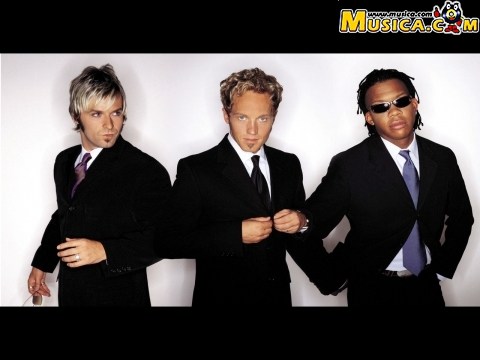
Biografía de DC Talk
Even before releasing their album Supernatural, dc Talk had emerged as leaders in the pursuit of melding rock 'n' roll with provocative questions of faith.
Although various rock predecessors have examined spiritual issues - U2, Van Morrison, and Bob Dylan immediately come to mind - dc Talk has taken the notion to new lengths, both in commercial terms and depth of artistic exploration. Numerous Dove Awards, three Grammy Awards, two platinum albums, two gold albums and two gold-certified long-form videos attest to the group's ability to bridge the wall between religious and secular audiences.
Now Supernatural threatens to raze the barrier completely. For behind its exquisite, edgy assault lies an album's worth of themes which spread beyond the confines of genre. "We're very open about our Christian faith," says Toby McKeehan, "but when we make our records we want to create a musical experience that anyone can immerse themselves in. One of our goals is to encourage listeners to question themselves and to seek out truth."
With that in mind, McKeehan and his dc Talk partners - Michael Tait and Kevin Max - unleash their fifth album, the follow up to their platinum-plus 1995 breakthrough Jesus Freak. Supernatural does have one obvious distinction from their past albums. Tait explains, "This is the first record we've ever written together so that makes it more of a collective vision than ever before." The smoldering "Consume Me" expresses spiritual devotion in intimate terms. "We view our relationship with God as very personal," says McKeehan, "and some people might get upset because the relationship in 'Consume Me' is so passionate and real, rather than ritualistic. We wrote this as a spiritual song because to us, faith is a passionate, personal, committed love relationship with Jesus Christ."
Supernatural also rocks with abandon. Brawny guitars and aggressive grooves punctuate most of the album's 11 tracks, especially "Fearless," "Dive," "Killing Me," and the album's ambitious title song "Supernatural." Elsewhere, dc Talk manages to get funky ("Wanna Be Loved"), freaked out (The Truth"), and outright funny ("My Friend So Long"). And the unabashed pop sonics of "Since I Met You" and "Godsend" emphasize a fundamental point: dc Talk is willing to let their music speak for itself, without regard for pigeonholes.
"Yeah, part of us is message-oriented; another part is entertainment driven," says Kevin Max. "I'd like the music to make an impact on as many levels as possible," admits Michael Tait. "If that sounds like a lofty, ambitious goal, that's okay. If one person likes the way it sounds, and another likes what the lyrics are saying, both are valid and both are important."
Produced by McKeehan and Mark Heimermann (as was Jesus Freak), Supernatural was recorded over the period of one year in the group's Nashville home base. The vocal styling of the trio's earlier work has blossomed and expanded into a multi-textural tapestry of sound, as vocals and instruments interweave with a wide range of stylistic influences. "I think we found our voices as a group," nods Max; "It's as if we're speaking as one, and the added input gives the album a broader, more diverse scope."
Viewed in this context, the maturity and sophistication of Supernatural reflects the latest stage in an ongoing growth process which began when the three members first met in the mid-1980s while attending college in Virginia. After relocating to Nashville, dc Talk released a series of increasingly ambitious - and successful - albums, beginning with their self-titled 1989 debut; followed by their gold-certified 1990 sophomore album Nu Thang; the platinum-certified 1992 opus Free At Last, and 1995's Jesus Freak, a platinum-plus watershed which afforded the group more mainstream success than ever before.
In addition to their recordings, live performance is a crucial part of the dc Talk story, and the group's fiery on-stage delivery has earned respect from virtually all quarters. "Live music is what being a musician is all about," says Max; "When you perform a song live, that's when you really begin to understand the song's meaning." Tait adds 'when you yourself are having as much fun - if not more - than the audience, that's the essence of a live show."
Whether forging strong bonds with concert audiences, or expressing their faith in the recording studio, dc Talk strives to treat their listeners as equals, rather than receptors. McKeehan says, "We want to make music that encourages people to think about the things we think about - spiritual issues and truth." Max adds, "Just as we all share the idea of caring and conscience, we also share the hunger to find truth and meaning in life."
With Supernatural, dc Talk once again encourages each listener to set out on their own journey of discovering The Truth.
Fuente: BENNY J.C a través de Musica.com